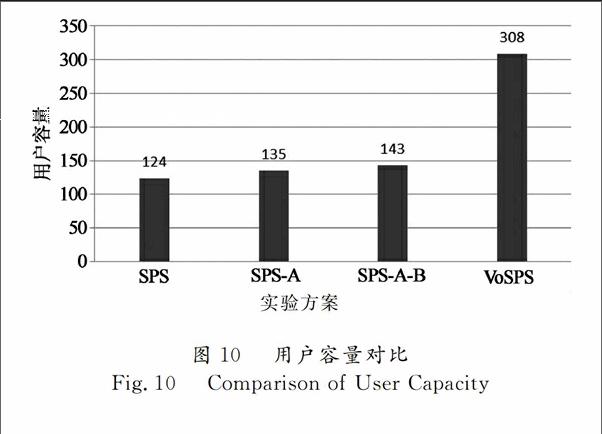一种卫星移动通信语音业务半持续调度机制
费长江等



摘要:基于LTE的卫星移动通信系统将3GPP LTE标准与卫星通信技术相结合,对实现移动通信的高速全球覆盖具有重要的意义.然而,卫星通信面临的高误码率、上下行带宽非对称等问题,对卫星移动通信的资源调度和服务质量保证提出了重要挑战.以LTE半持续调度机制为基础,针对卫星移动通信语音业务,提出了一种上行无线资源调度方案VoSPS. VoSPS中增加了基于上行信道质量的准入机制和截断机制,减少了上行资源的浪费;引入了一种基于语音服务满意度的语音编码速率调整算法,增加了系统的用户容量.仿真结果表明,VoSPS能有效提高系统的用户满意度和语音业务容量.
关键词:LTE;卫星移动通信;语音业务;半持续调度
中图分类号:TN929.5 文献标识码:A
A Semipersistent Scheduling Mechanism
for Voice Service in Satellite Mobile Communication
FEI Changjiang, WU Chunqing, ZHAO Baokang, YU Wanrong, FENG Zhenqian
(School of Computer, National Univ of Defense Technology, Changsha,Hunan410073, China)
Abstract:LTEbased (Long Term Evolution) satellite mobile communication system combines 3GPP LTE standards and satellite communication technology and has important significance for the global coverage of mobile communication at a high speed. However, the problem of high bit error rate and bandwidth asymmetry in satellite communication constitutes a great challenge for the wireless resource scheduling and QoS (Quality of Service) guarantee in satellite mobile communication. Based on the semipersistent scheduling mechanism in LTE, we proposed an uplink wireless resource scheduling scheme named VoSPS (Voice service Semipersistent Scheduling). We added an access permission mechanism and a truncation mechanism based on uplink channel quality to VoSPS, reducing the waste of uplink resources. We also introduced a speech coding rate adjustment algorithm based on voice service satisfaction, which increased the user capacity of the system. The results of the simulation show that VoSPS can increase user satisfaction and the voice service capacity of the system effectively.
Key words:LTE; satellite mobile communication; voice service; semipersistent scheduling
基于LTE的卫星移动通信系统将长期演进LTE(Long Term Evolution)标准应用到卫星通信中,是陆地蜂窝移动通信系统的扩展和延伸,在解决偏远地区、受灾区及人口稀少地区的移动通信服务方面具有独特的优越性.
语音业务是卫星移动通信最重要最基础的业务之一.然而,与地面LTE网络不同,卫星移动通信中星地链路面临的高误码率、上下行带宽非对称[1]等严峻问题,对无线资源调度和业务的服务质量保证提出了极大的挑战.因此,如何充分有效地利用系统链路资源,尤其是上行资源,成为提高系统用户满意度和语音业务容量的关键.
本文在LTE半持续调度[2]机制基础上,提出了一种支持卫星移动通信语音业务的上行无线资源调度方案VoSPS(Voice service Semipersistent Scheduling).针对星地链路高误码率的特点,VoSPS中加入了基于上行信道质量的准入机制和截断机制.用户信道质量恶化时,数据误码率增大,产生大量的重传数据,同时自适应调制编码AMC(Adaptive Modulation and Coding)技术[3]使得用户占用更多无线资源.准入机制和截断机制避免了信道质量严重恶化的用户对无线资源的浪费.
针对上下行带宽非对称的特点,为了充分利用系统的上行资源,增大用户容量,VoSPS中提出了一种基于语音服务满意度的语音编码速率调整SCRA(Speech Coding Rate Adjustment)算法.当系统没有足够的空闲资源响应用户的呼叫时,合理降低现有用户的语音编码速率,减少他们占用的资源,从而为新呼叫分配资源.

